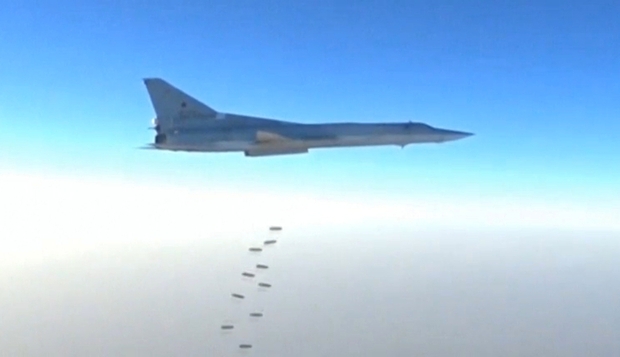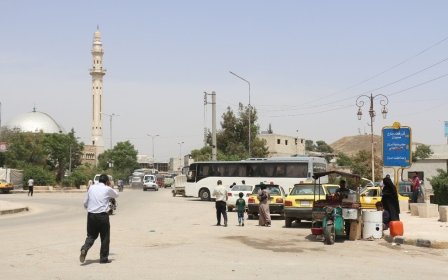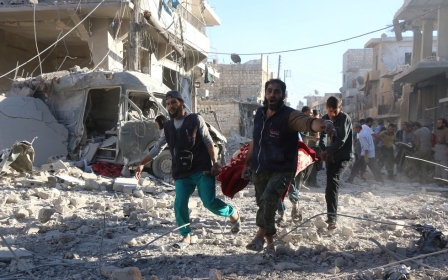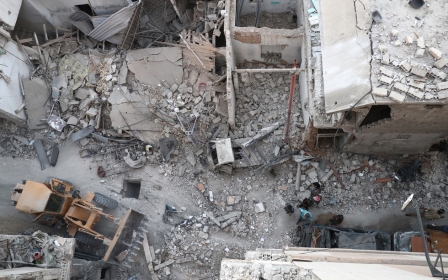Russia offers safe passage to rebels in Syria's Aleppo

Russia said on Thursday it was prepared to secure safe passage for rebels to quit Syria's Aleppo but kept up air strikes on the battleground city as world powers readied new truce talks.
The country said it was willing to give rebels a way out of Aleppo, where more than 250,000 people are under government siege.
"We are ready to ensure the safe withdrawal of armed rebels, the unimpeded passage of civilians to and from eastern Aleppo, as well as the delivery of humanitarian aid there," Russian Lieutenant General Sergei Rudskoy said in a televised briefing.
Earlier this month, UN envoy to Syria, Staffan de Mistura offered to escort rebels out of Aleppo himself.
Syria has been plunged into some of the worst violence of its five-year-war since the collapse of a truce brokered by Washington and Moscow last month.
The ensuing surge in fighting has accompanied a large-scale government offensive, backed by Russian air power, to capture the opposition-held half of Aleppo.
Early morning raids in east Aleppo killed at least seven civilians, The UK-based Syrian Observatory for Human Rights said, and government forces captured high ground overlooking opposition areas on the northeastern outskirts of the city.
The Observatory also said five children were killed by rebel rocket fire on western government-held neighbourhoods, with state television saying a school had been hit.
Residents in the west said they had been forced to pull over in their cars to take shelter in buildings because of the barrage of rebel fire.
UK, US mulling options
The UK is considering military options in the Syrian conflict, but any action would need to be part of a coalition involving the United States, Britain's foreign minister said on Thursday.
"It is right now that we should be looking again at the more kinetic options, the military options," Boris Johnson told the foreign affairs select committee of MPs. "But we must be realistic about how these in fact work, and what is deliverable," he added.
"We can't do anything without a coalition, without doing it with the Americans. I think we're still a pretty long day's march from getting there, but that doesn't mean that discussions aren't going on, because they certainly are."
A spokeswoman for the British prime minister, Theresa May, took a more cautious approach: "There are no plans for military action," she said. "We are working with the international community to look at how to bring the conflict to an end."
The spokeswoman added that there were a range of options available.
Britain's parliament rejected calls in 2013 to target the Syrian government, led by President Bashar al-Assad, after the deaths of hundreds of civilians in chemical attacks that the UN has since said originated from the government in Damascus.
"We cannot just see Aleppo pulverised in this way, we have to do something. The mood of the House of Commons has changed from 2013," Johnson said.
"Most people I think are changing their minds on this and are thinking we cannot let this go on forever. Whether that means we can get a coalition for a more kinetic action now I cannot prophesy. But what most people want to see now is a new set of options."
"We cannot just see Aleppo pulverised in this way, we have to do something" - Boris Johnson, UK foreign minister
He said that intensifying sanctions on key players in the Assad government was another option open to Britain. But Johnson reaffirmed his belief that Britain should not raise "false hopes" about the idea of a no-fly zone to prevent Russian and Syrian government attacks on Aleppo.
"I must tell you, at this stage it is vital that we do not raise false hopes. We know the difficulties and implications of a no-fly zone or a no-bombing zone," he told the parliamentary committee.
"But if there is more that we can reasonably and practically do, together with our allies, then of course we should consider those measures."
Johnson said the UK had "a very serious problem with Russia,” accusing Moscow of being “reckless and aggressive”.
Diplomatic negotiations for a truce in Syria have been numerous but ultimately ineffective. Washington and Moscow had worked closely in recent months and reached a deal in mid-September that was billed as the "best chance" to end Syria's bloodshed.
But the truce fell apart after a week, and peace efforts have since struggled to get off the ground.
This article is available in French on Middle East Eye French edition.
New MEE newsletter: Jerusalem Dispatch
Sign up to get the latest insights and analysis on Israel-Palestine, alongside Turkey Unpacked and other MEE newsletters
Middle East Eye delivers independent and unrivalled coverage and analysis of the Middle East, North Africa and beyond. To learn more about republishing this content and the associated fees, please fill out this form. More about MEE can be found here.




